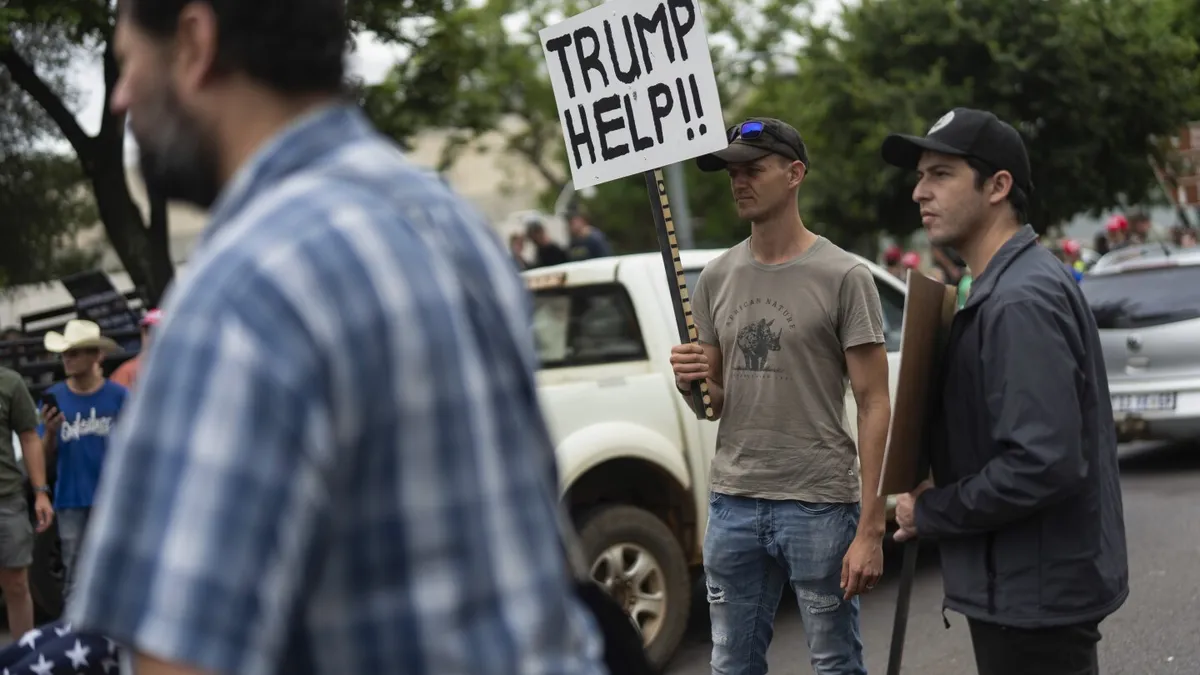
The Trump administration is set to initiate a controversial relocation effort by bringing a small number of white South Africans to the United States as refugees. This move, scheduled for next week, is framed by the administration as a response to the perceived persecution of this minority group by the Black-led government in South Africa, which the U.S. claims is racially motivated. The applications of these individuals are being fast-tracked following President Donald Trump's announcement of the relocation program back in February.
While the U.S. government has adopted a stringent anti-migrant stance, suspending refugee programs from various regions including Iraq, Afghanistan, and many nations in sub-Saharan Africa, this new initiative raises eyebrows among refugee advocacy groups. These organizations are questioning the rationale behind prioritizing the relocation of white South Africans over others who may also be in dire need of assistance.
In response to the allegations from the U.S. government, the South African government has strongly refuted claims that the white minority, particularly the Afrikaners, are facing persecution. Officials describe these assertions as "completely false" and rooted in misinformation, emphasizing that Afrikaners are among the wealthiest and most successful demographics in the country. This group, numbering approximately 2.7 million in a population of 62 million—of which over 80% is Black—has significant representation in various sectors, including business and government.
Afrikaners, descendants of Dutch and French colonial settlers, are an integral part of South Africa's daily multi-racial life. They hold prominent positions in business and politics, with their language recognized as an official one in the country. Many South Africans, including non-Afrikaners, communicate in Afrikaans, and institutions reflecting Afrikaner culture are prevalent across the nation.
The U.S. claims that the persecution of Afrikaners is primarily based on a series of violent farm attacks targeting white individuals in rural areas. Both President Trump and his South African-born adviser, Elon Musk, have accused the South African government of implementing racist policies against whites. However, the government contends that these attacks are exaggerated and mischaracterized, attributing them to the broader issue of violent crime affecting all races in South Africa.
According to a report from AfriForum, an Afrikaner organization that tracks such incidents, there were 49 farm homicides in South Africa in 2023, which is a small fraction of the over 20,000 total homicides recorded annually. Experts suggest that rural areas are particularly vulnerable to crime due to their isolation and lack of police presence, and indicate that Black farm owners and workers also face violence.
The Trump administration has criticized South Africa's affirmative action policies, labeling them as discriminatory against whites. Allegations include claims that new expropriation laws threaten white South Africans' land ownership, though the government has clarified that no land has been confiscated. Some Afrikaner communities express fears that they are being targeted, a sentiment echoed by certain political factions.
It is essential to note that Afrikaners represent only a portion of South Africa's approximately 4.5 million white citizens, which also includes individuals of British and other descents. The refugee program initiated by the Trump administration appears to focus exclusively on Afrikaners, who are often perceived as aligning with conservative and Christian values that resonate with the administration's political agenda. While it remains unclear how many Afrikaners have applied for refugee status, a U.S.-based business group claims to have received interest from tens of thousands.
The first group of more than two dozen Afrikaners is expected to arrive at Dulles International Airport outside Washington, D.C. on Monday, marking a significant step in this contentious relocation initiative.
As this situation unfolds, both local and international perspectives will continue to shape the narrative surrounding the treatment of Afrikaners in South Africa and the implications of their relocation to the United States.